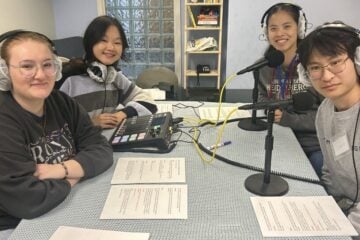NPR Network revenue programs net stations nearly $16M

Ted Eytan / via Creative Commons
The NPR Network’s revenue programs will provide stations with at least $15.7 million this fiscal year, National Public Media COO Bryan Moffett said Friday during an NPR board meeting.
“We are really happy with this number, and our focus is on keeping that number growing for this year and beyond,” he said.
As the NPR board met in open session for the first time since the rescission of CPB funds, CEO Katherine Maher also reported on plans to provide dues relief to stations and described strategic priorities for the year ahead.
The NPR Network initiative launched in 2022 with a goal of doubling station membership and total revenue.
As of Sept. 3, NPR has raised $8 million in FY25 through its streamlined donation form on NPR.org and the NPR+ podcast bundle. Revenue from those programs goes directly to stations. “That number grows every single week,” Moffett said. About 130 stations participate in the programs. NPR’s fiscal year ends Sept. 30.
NPR also shares revenue it earns through the NPR Network donation option on NPR.org and through NPR+ single-podcast subscriptions. All stations share half of the funds contributed through the NPR Network donation option and 20% of revenue from NPR+ single-podcast subscriptions. The total revenue from those two programs as of Sept. 3 was $7.7 million, Moffett said. The first distribution of net revenue from the NPR Network donation form and NPR+ was $1.26 million in 2023.
In the nearly three years since it launched, the NPR Network donation option has raised more than $16 million from 184,000 donations, Moffett said. The majority of the revenue has come this year.
Moffett said that the donations to the NPR Network don’t seem to be undercutting donations to stations.
“The donations to the NPR Network continue to increase every month, and the donations to stations also continue to increase each month, which shows that the rising tide is definitely lifting all boats,” he said.
“Our focus for this year is to continue streamlining the donor experience,” he said. “We are rolling out improvements to the donation platform, and we’re expanding options for stations to participate in the audience revenue programs. And we’re also putting a lot more effort into retaining the donors we have acquired through these efforts.”
On the journalism side, NPR is launching a pilot this month to streamline how member station journalists pitch story ideas to NPR, Moffett said.
“This should simplify the process and give station reporters one clear way to reach NPR,” he said.
Dues relief
While revenue from NPR to stations is growing, NPR is reducing fees to stations hit hardest by federal funding cuts.
“The rescission vote does nothing to fundamentally alter our purpose, value and mission to our country,” CEO Katherine Maher said during the meeting. “Public radio stations are vital community institutions, bulwarks of local journalism, and part of our country’s emergency response. Commercial media cannot and will not replace this role. Although we are sure of the purpose of this work, the year ahead is somewhat less certain, and we acknowledge that.”
She said that 148 stations have received fee relief totaling $8 million after the NPR board voted to reduce the organization’s FY26 operating budget in July. She added that the fee relief was for stations that received at least 10% of their funding from CPB; 43% of the recipients are in rural areas, she said.
Still, NPR will lose three member organizations, Gemma Hooley, SVP for member partnership, reported during the meeting. They are the Alabama Educational Television Commission, which runs WLRH in Huntsville, Ala.; the Tillicum Foundation, which owns KMUN in Astoria, Ore.; and Gulf Coast State College, licensee of WKGC in Panama City, Fla.
NPR is also gaining a member, Baltimore Community College, which owns WBJC, beginning Oct. 1. With the membership changes, NPR will have 244 members, she said.
‘Moment of transformation’
Maher noted the “moment of loss” from federal funding cuts but said the months of coordinating to save federal funding brought the network closer together and now present an “opportunity … to think about our network and our mission for the future.”
The board reviewed plans Thursday on digital transformation and “deepening our network collaboration in local and national journalism,” she said.
In the year ahead, she said, NPR will work with stations “to chart a course on network strategy, strengthening our national journalism footprint, digital strategy, audience engagement, growth and revenue, reintroducing public media through brand and marketing efforts, the future of music in our network, shared services and a reimagining of what does it mean to be an NPR member.”
“We at NPR are ready to step into this moment of transformation,” Maher said.
Maher added that NPR will enter the coming fiscal year with “a stable, balanced budget.”







Public radio and television is a complicated entity or should that be plural? As I said, complicated even to a long time listener and watcher! I sincerely hope the funding needed will materialize (I do what I can!) but I am a little bit leery of all those plans cited at the end of this report of the bord meeting. I would caution about the use of all that jargon that just sounds like corporate speak and also maybe very costly? But you do sound optimistic, which we all need to hear from you, so best of everything (especially funding efforts), as you get through this terrible administration and its vengeful policies and behavior.